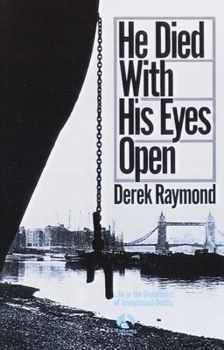Book Overview
As it turns out, a dead man can tell stories... Murders are a dime a dozen in Margaret Thatcher's London, and when it comes to the brutal killing of a middle-aged alcoholic found dumped outside of... This description may be from another edition of this product.
Format:Paperback
Language:English
ISBN:0345342895
ISBN13:9780345342898
Release Date:March 1987
Publisher:Random House Publishing Group
Length:240 Pages
Weight:0.82 lbs.
Dimensions:0.5" x 5.5" x 8.5"
Related Subjects
Contemporary Fiction Literary Literature & Fiction Mystery Mystery, Thriller & SuspenseCustomer Reviews
5 ratings
James M. Cain...on octane
Published by Thriftbooks.com User , 14 years ago
I can't believe I never knew about this writer until recently...having accidentally discovered him on the Net. The only warning here is: once you start reading, you can't stop. Also, I gave his I WAS DORA SUAREZ five stars. The book is so strong it just might make a few people vomit. Would love to get The Hidden Files, only it seems tough to locate here in the U.S. Lastly, you might be bummed out to know Raymond died back in l994. At least we have the books. Powerful stuff indeed.
Stunning book, Stunning series
Published by Thriftbooks.com User , 15 years ago
I've been working my way (out of order) through the Factory Series, and I don't think there's a more stunning or better written series of crime novels than these. This is the 1st in the series (and the 3rd that I read), and is grim stuff as our nameless detective listens to the cassette recordings left behind by a brutally murdered man, and grows to deeply respect and feel the anguish of this man's life, while at the same time hating those who had lived parasitically off this man. This is very grim stuff, in a way a meditation on dying and the hopelessness of life, but a must read for anyone who's a fan of hardboiled and noir literature.
Start of a Quirky Series
Published by Thriftbooks.com User , 15 years ago
This is a series that lacks a lot of things. The main character lacks a name. He also lacks human emotion and emotional brakes. His life is a random series of inertia. He would rather do nothing, but once he starts, whatever he's doing develops a life of it's own until it comes to a conclusion (not always satisfactorily). He works as a 'sergeant' in the "Factory" (Metropolitan Police) in the Department of Unexplained Deaths'. Unlike the SCD (Serious Crimes Division) the DUD (get it!) gets the murders of prostitutes, drug addicts and the other detritus of society. The crimes of course are serious but only to those they are perpetrated on. Our Sergeant is called on to a murder scene of a man found in the bushes just off a main highway (the A2). The man has been beaten brutally (all of his major bones have been broken and then he was hit on the head with a hammer). He has no identification. But he is a nobody. The Sergeant has a nemesis/colleague in SCD who is trying to get him to move up. The Sergeant says, "I like my independence." But what he really likes is to be able to work by himself, drink when he wants and work a case the way he wants. The Sergeant works his way through the underbelly of late 1950s London. The city is still showing it's ruff edges left over from the War and rationing has just ended. But there is still a large unemployed under- class that lives on the margin of society. This is the Sergeant's milieu and he doesn't want to leave it. It's as much a part of him as he is a part of it. The story and the solution are no great shakes, but they aren't the reason to read the story. The descriptions of the other side of London at this time in history and the way people lived and spoke is the real reason to read the novel. Zeb Kantrowitz
Not perfect, but a powerful portrait of early eighties London
Published by Thriftbooks.com User , 18 years ago
The conventional technique of the policer thriller takes second place in this novel. Nor is it really even a suspense book, though it has moments of suspense. The depiction of London though, is what makes it stand out for me. The ugliness of its postwar concrete precincts, and the ugliness of the people's psyches, are sketched in an unnatural harmony. As other reviewers have said, this book is about the textures of the seedy places in which the detective operates. You can almost smell the inside of the pubs, the exhaust fumes, the beer, the guinness, whiskey and sweat. My only difficulty was the use of excerpts from the murdered man's tape cassettes - at times these were powerful, but elsewhere, I wanted to be back on the street. Otherwise, a fine bit of writing from the edge of the abyss.
Bleak, but Beautiful
Published by Thriftbooks.com User , 20 years ago
This is one classic slice of British noir. One reviewer compared the writing to Ellroy and I would agree. If the writing is like Ellroy, I would would compare Raymond's nameless Factory detective to Danny Upshaw, the sheriff's deputy from The Big Nowhere -- doggedly chasing down a case that no one seems to care about too much. There's also some Philip Marlowe in the empathy that the detective has and the way he finds something worthwhile about what was apparently a very sad and lonely man whose murder he's investigating.If the ending seems over-the-top to you, then you haven't read many of the best crime novels! High drama and the dueling sides of everyone's personality are what makes much of the best noir tick. Check this one out for some honest appraisal of the darker side of life and how you can always glean some beauty out of the ugliness if you dig deep enough.





